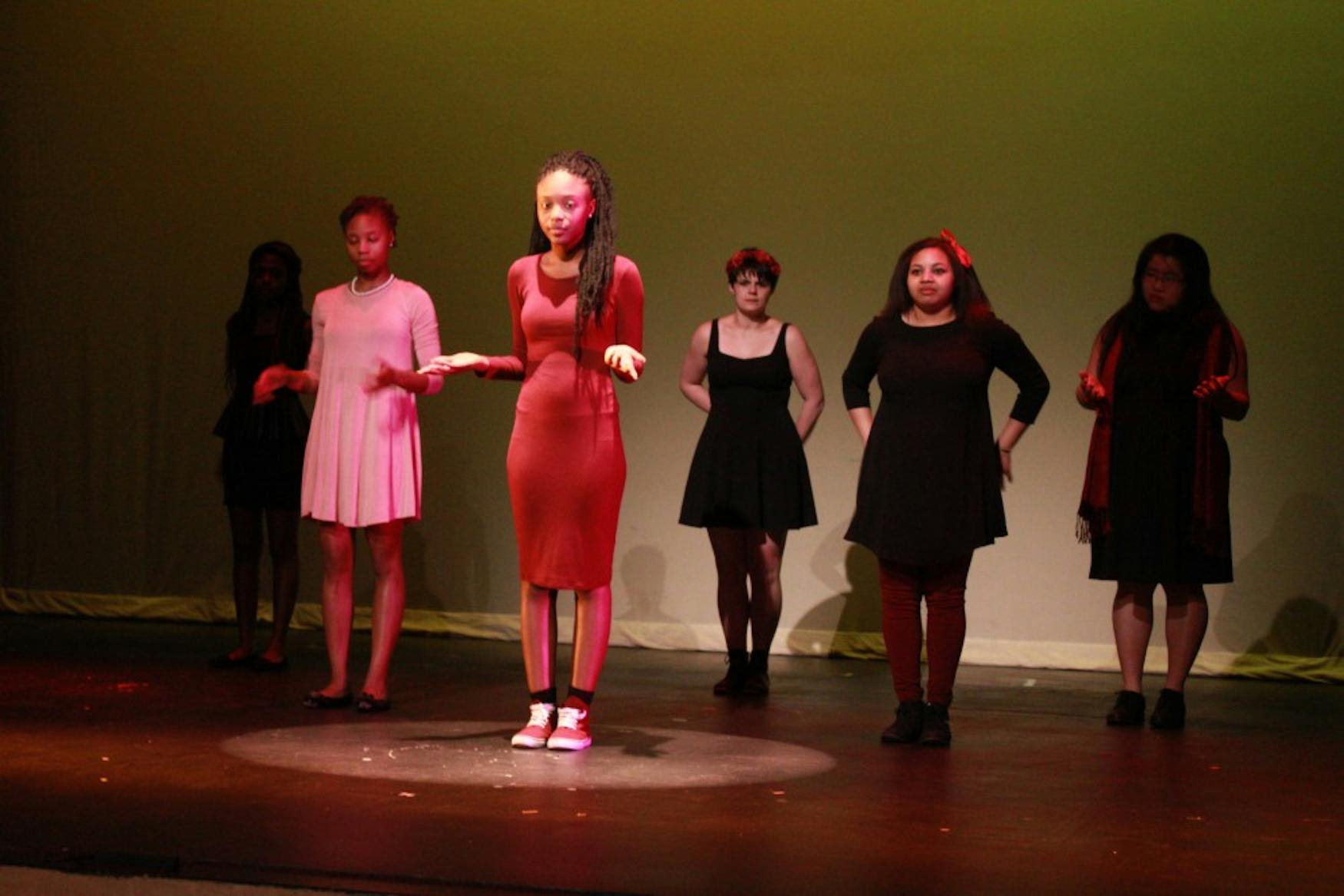‘Vagina Monologues’ empowers women
Correction appended.
This past weekend in the Shapiro Campus Center theater, Brandeis held its annual production of The Vagina Monologues. The Vagina Club presented the production in honor of the club’s annual Vagina Week. The play was a colorful collage of different Brandeis female students talking about women’s experiences and celebrating women. The actresses in this play were bold and uninhibited, and the audience sat captivated as they took the stage.
According to the Facebook page for the event, “In 1994, Eve Ensler began collecting interviews with women about womanhood and vaginas. From some of their experiences, she crafted The Vagina Monologues.”
In an interview with the Justice, the show’s director, Jemesh Hunter ’15, said that “[The Vagina Monologues] was the beginning of a campaign against violence against women … It’s basically a platform for women to talk about their womanhood through a vagina.” The monologues featured a wide range from characters who were survivors of sexual assault, to women having sexual awakenings at all ages to women learning about the vagina as part of their body and learning to embrace it.
The production did not feature a set—rather, it featured a white backdrop of changing lights—and the performers wore clothing in colors of black, maroon, plum and orange. The unadorned stage sent a clear message: the audience’s attention was not to be distracted from, but focused on, the actors delivering their monologues.
The show opened with a conversation about the word “vagina.” The actors talked about the implications of the word. They acknowledged how uncomfortable the word can be to use, and how many people shy away from using it at all. This was their premise. They first recognized how uncomfortable so much of society is with vaginas and discussions about them, so that they could move past that and talk about why they embraced them.
Throughout the monologues people would snap, clap or cheer in appreciation of a particular point that resonated with them. Audience member Sarah Adler ’16 said, “‘My Angry Vagina’ was my favorite monologue. She [Jessica Hood ’15] was on point! She was such a great actress and so much of what she said, and the way she said it, made me think ‘me too!’” The monologue Adler refers to is a rant about the things people shouldn’t do to vaginas, how vaginas have to be treated with respect, and about the problems with the gynecologist’s office. Hood was assertive and owned the stage as she lectured the audience about vaginas.
I think that seeing the show is a deeply emotional experience for women, especially those who can identify with the characters and realize that they have shared experiences. Hunter said, “It’s a big thing about the experience, more so than just the acting … and how important it is to have a bonding experience with women who are all trying to learn something about themselves through this project.”
A harder monologue to listen to was about Bosnian women who were raped during the war in Yugoslavia, entitled “My Vagina Was My Village,” and played by Kiana Nwaobia ’17. It was due to monologues like this one that the show was preceded by trigger warnings. The graphic monologue was difficult to hear, and this alone demonstrated how important it was to be heard.
Arielle Keller ’16 said, “Even if that particular event [in Bosnia] is over, events like that are not, unfortunately. So, I think that it’s really important to talk about these experiences, especially when it’s so poignant and so shocking because it gets people talking.” Nwaobia broke the audience’s heart with her monologue of how she was serially raped by soldiers.
Much of the show was about the difficult experiences that women go through and how these experiences can’t be covered up. One of the monologues entitled “My Short Skirt,” played by LaQuasia Cherry '17 and Michelle Richardson '15, talked about how short skirts are not an advertisement or an excuse for raping women. This statement seemed necessary, as the “short skirt” assumption is an integral part of rape culture.
When asked if she had any issues with the play, Hunter described a scene in which a 16-year-old girl has a positive sexual encounter with a 21-year-old woman, “ ‘The Little Coochie Snorcher That Could’ with the 16-year-old girl is practically statutory rape, but you can’t discount what this woman went through; it’s her experience. It’s showing how she came in touch with herself and with women … This helped her understand who she is.”
Interestingly, the performance’s monologues focus on positive sexual experiences with other women and bad sexual experiences with males. There was one monologue that was positive in relation to heterosexuality, but the monologue’s introduction posited that this was an exception.
The production’s content may have made some viewers uncomfortable, but overall, seeing the play was a positive experience. The play was powerful and hit all the monologues with emphasis. The show did a great job of making its message of getting women to embrace the vagina as part of their body and female empowerment. In a culture whose history and present often subjugates women, this play fights against that and empowers women to join that fight. It was a triumph for Brandeis women.
An earlier version of this article incorrectly stated that Bethlehem Seifu '16 appeared in "My Short Skirt." LaQuasia Cherry '17 and Michelle Richardson '15 performed the monologue.



Please note All comments are eligible for publication in The Justice.